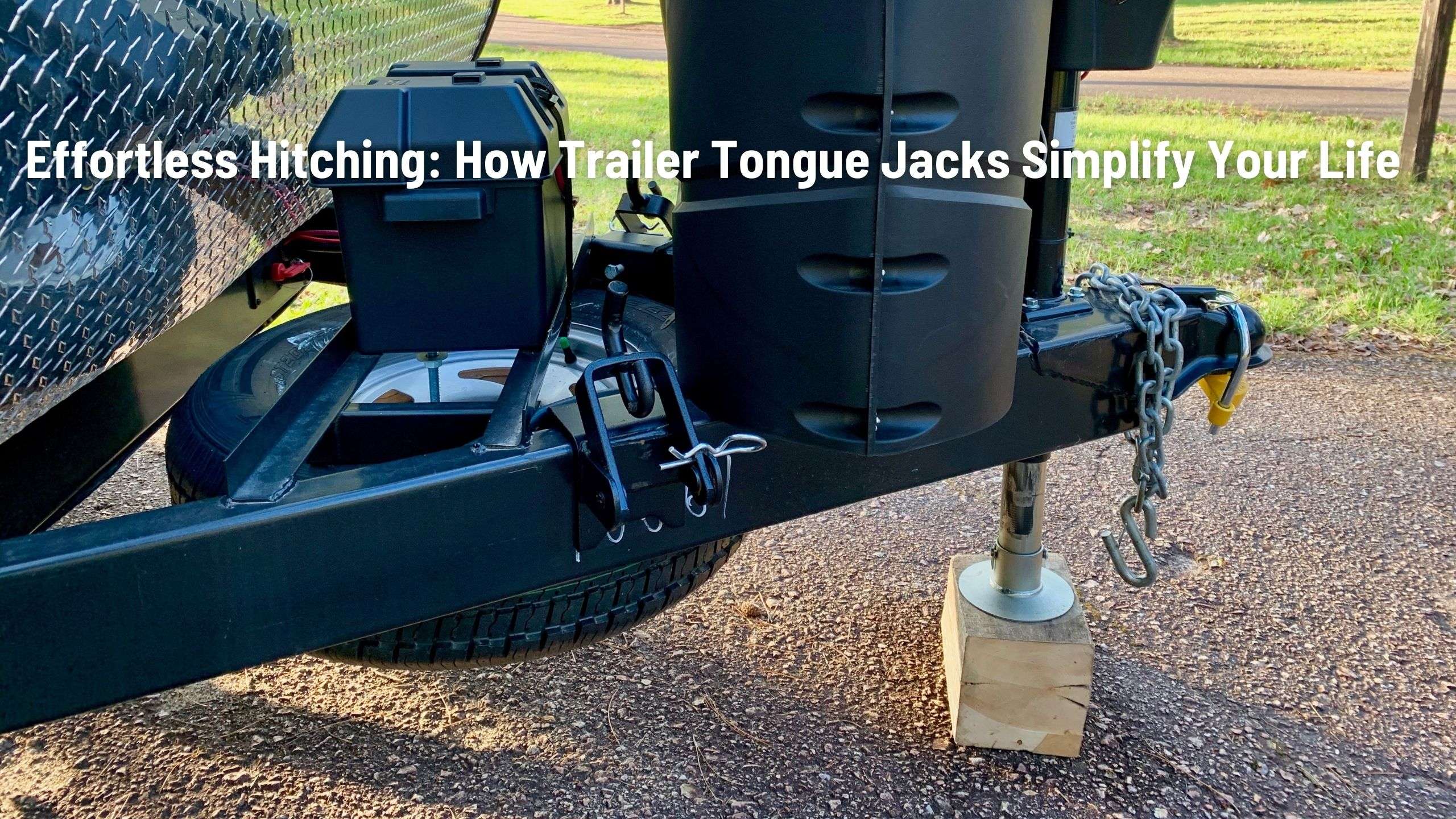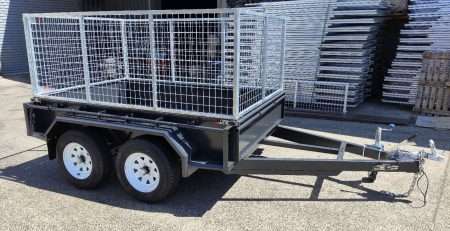
Effortless Hitching: How Trailer Tongue Jacks Simplify Your Life
Understanding Trailer Tongue Jacks
In the world of trailers and towing, the importance of certain pieces of equipment cannot be overstated. One such indispensable item is the trailer tongue jack. But what exactly are these jacks and why are they so important?
Defining Trailer Tongue Jacks
Trailer tongue jacks are devices used to support the front end of a trailer when it is disconnected from the towing vehicle. They play a crucial role in keeping the trailer level and stable. In addition to providing stability, these jacks are also used to raise and lower the front end of a trailer when it is not attached to a vehicle, making the process of hitching and unhitching significantly easier.
Importance of Trailer Tongue Jacks
Trailer tongue jacks are an essential piece of equipment for towing trailers. They not only provide stability but also ease of movement when hitching and unhitching (Camp Addict).
Without a trailer tongue jack, coupling and decoupling a trailer to a tow vehicle can be a daunting and strenuous task. By lifting the front end of a trailer or RV, these jacks significantly simplify this process, thereby saving time and effort.
Moreover, these jacks play a vital role in preventing the trailer from tipping over or falling off the hitch when it is not attached to a tow vehicle. This stability is crucial for the safety of both the trailer and any contents inside it.
In summary, trailer tongue jacks are a key tool in the towing world, providing stability, safety, and convenience. Along with other essential equipment such as trailer hitch locks, trailer brake controllers, and heavy-duty trailer hitches, they form part of a comprehensive setup for safe and efficient towing.
Types of Trailer Tongue Jacks
There are several types of trailer tongue jacks available, each with their own set of advantages and usage scenarios. It’s important to understand the differences between manual, electric, and hydraulic jacks to make an informed decision that best suits your needs.
Manual Trailer Tongue Jacks
Manual trailer tongue jacks are the basic type of jacks that require physical effort to operate. As per Trailer Valet, these jacks are operated using a crank handle, which requires manual effort to raise and lower the trailer. Although they require more effort compared to electric or hydraulic jacks, they are often more affordable and do not rely on electricity or fluid pressure to operate, making them a reliable choice for situations where power resources may be limited.
If you’re considering manual jacks, it’s crucial to understand that, although they might require more physical effort, they also provide a high level of control, allowing you to make precise adjustments to the height and position of your trailer.
Electric Trailer Tongue Jacks
Electric tongue jacks are becoming increasingly popular due to their convenience and ease of use. These jacks, as their name suggests, are motor-powered and operate with the push of a button to save time and effort (Family Handyman). Many models even come with a remote control for added convenience.
According to Camp Addict, the effortless operation of electric jacks has made them a popular choice among trailer owners. However, it’s important to note that they rely on a consistent power source, which can be a limitation in certain situations.
Hydraulic Trailer Tongue Jacks
Hydraulic trailer tongue jacks work on the principles of fluid mechanics and leverage. Similar to electric jacks, they reduce the physical effort required to raise or lower a trailer. However, instead of relying on electrical power, hydraulic jacks use fluid pressure to lift or lower the load.
While hydraulic jacks might be more expensive than manual or electric jacks, they offer significant advantages in terms of durability and lifting capacity. These jacks are often used for larger trailers and heavy-duty applications.
In conclusion, the choice between a manual, electric, or hydraulic trailer tongue jack will depend on your specific needs, budget, and the type of trailer you have. Always ensure to consider factors such as the weight of your trailer, the availability of a power source, and the level of physical effort you’re willing to exert when making your decision.
Choosing the Right Trailer Tongue Jack
When it comes to selecting the perfect trailer tongue jack, there are several factors to take into account. In this section, we discuss two of the most critical considerations: weight capacity and compatibility with hitch types.
Weight Capacity Considerations
The weight capacity of a trailer tongue jack is perhaps the most important factor to consider when choosing the right jack for your trailer. The weight capacities of trailer tongue jacks—such as 1,000 lbs, 2,000 lbs, or 5,000 lbs—typically serve as a classification. The capacity can range from 500 pounds to over 10,000 pounds, depending on the specific model (HowStuffWorks).
It’s essential to match the jack’s capacity with the weight of your trailer. Ideally, the capacity of the jack should be equal to or greater than the total weight of the loaded trailer. This ensures that your jack can safely and effectively lift and support your trailer when you need it to. Failure to correctly match the weight capacities could lead to equipment failure or, even worse, a dangerous situation.
Compatibility and Hitch Types
Different trailer tongue jacks are compatible with different types of hitches. Therefore, it’s crucial to ensure that the jack you choose is compatible with the hitch on your trailer.
There are several types of trailer tongue jacks available, including manual jacks, electric jacks, and hydraulic jacks. Each type has its own advantages and disadvantages, and the best choice depends on your specific needs and preferences. For example, while manual jacks are often more affordable, electric and hydraulic jacks offer the advantage of easier operation.
When selecting a trailer tongue jack, remember to consider other factors as well, such as the jack’s construction, durability, and features. Also, don’t forget to check out our articles on other important trailer equipment like trailer hitch locks, trailer brake controllers, and trailer lights and wiring.
By taking the time to carefully consider these factors, we’re confident you’ll find the perfect trailer tongue jack for your needs.
Features of Trailer Tongue Jacks
Modern trailer tongue jacks come with a variety of features designed to make hitching and unhitching as effortless as possible. In this section, we will explore two key features that greatly enhance the functionality and convenience of trailer tongue jacks: integrated levels and lights and remote control operation.
Integrated levels and lights
One of the standout features of some trailer tonguejacks is the inclusion of integrated levels and lights. The built-in levels assist in easily determining whether your trailer is level or not, which is essential for safe and secure hitching.
In addition to this, integrated lights offer improved visibility during the hitching and unhitching process, particularly in low-light conditions. This added feature enhances safety and reduces the risk of missteps that could lead to accidents.
Consider these features when choosing your trailer tongue jack, especially if you frequently hitch and unhitch your trailer under varying lighting conditions. Remember that a safe hitching process is crucial, and these features are designed to aid in that process.
Remote Control Operation
Some trailer tongue jacks also offer remote control operation, which is a useful feature. This function allows you to operate the jack from a distance without the need for manual cranking, providing convenience and ease of use. With the push of a button, you can raise or lower your trailer, ensuring a smooth and effortless hitching experience (Camp Addict).
Remote control operation reduces the physical effort required when dealing with heavy trailers, making it a beneficial feature for those who frequently transport large loads. This feature, combined with integrated levels and lights, significantly enhances the functionality of trailer tongue jacks and simplifies the hitching process.
In essence, the added features of trailer tongue jacks not only simplify the process of hitching and unhitching but also contribute to the overall safety of trailer operation. As a trailer owner, consider these features when looking for the best trailer tongue jack for your needs. For more information on other trailer accessories that can enhance safety and ease of use, check out our articles on trailer hitch locks, trailer brake controllers, and trailer backup cameras.
Proper Use of Trailer Tongue Jacks
Using trailer tongue jacks correctly is essential for both the efficient operation of your trailer and your safety. In this section, we will guide you through the procedures for hitching and unhitching, as well as provide maintenance and care tips for your trailer tongue jack.
Hitching and unhitching procedures
A trailer tongue jack’s primary function is to raise and lower the front end of a trailer, making it easier to hitch and unhitch from a tow vehicle. When hitching, the jack is used to lift the trailer’s tongue off the ground to align it with the tow vehicle’s hitch. After connection, the jack is retracted to ensure the trailer is level when towed (Camp Addict).
When unhitching, the process is reversed. The trailer tongue jack is extended to lift the trailer’s tongue off the tow vehicle’s hitch. Once the trailer is disconnected, the jack is further extended to level and stabilize the trailer, preventing it from tipping over or falling off the hitch.
Maintenance and care tips
Proper maintenance and care of your trailer tongue jack can extend its lifespan and ensure its efficient operation. Here are some tips:
- Regularly inspect the jack for any signs of wear or damage. Pay special attention to the gears, as these are often the first parts to wear out.
- Lubricate the jack regularly to ensure smooth operation. Use a high-quality grease and apply it to the gears and other moving parts.
- Keep the jack clean. Dirt and grime can cause the jack to malfunction. Use a mild detergent and a soft brush to clean the jack, and be sure to dry it thoroughly to prevent rust.
- If your jack is electric, check the wiring regularly. Make sure the connections are secure and there are no frayed wires.
- Store the jack properly when not in use. If possible, remove the jack from the trailer and store it in a dry, cool place.
- Always follow the manufacturer’s instructions for use and maintenance.
By following these procedures and tips, you can ensure the longevity and reliability of your trailer tongue jack. For more about trailer parts and accessories, explore our articles on topics like trailer hitch locks, trailer brake controllers, and trailer safety chains.
Author
I am Rahatul Ashiq Tamal. Another author of Muscle Trailers. Muscle Trailers is a well-known trailer brand in Sydney, Melbourne & Adelaide

How to Mount a Spare Tire on Your Trailer: A Simple Step-by-Step Guide
Trailer service centers receive over 1 million phone calls and 1.3 million emails each year about trailer maintenance problems....

How to Fix RV Roof Leaks: Simple Roof Leak Detection Guide for Beginners
Did you know DIY RV roof repairs can cost under $50? But undetected leaks could lead to substantially higher repair...

Starting a Food Truck Business in Australia: From Trailer Selection to Launch
The Australian mobile food market has evolved into a billion-dollar industry. This makes a food truck...
